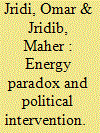| Srl | Item |
| 1 |
ID:
150901


|
|
|
|
|
| Summary/Abstract |
This paper develops a model that explains the delay of decisions to adopt profitable energy-saving investments. This problem is known as the energy paradox. The model rationalizes the profitability requirements raised by the irreversibility, the uncertainty and the decrease of costs as a result of learning by doing. In this context, the wait gives investors more visibility and more lower investment costs, which gives them an option value. The representative agent has an interest to postpone its energy saving decision until future benefits increase and equalize its required option value. Formally, we internalize these explanatory factors in a stochastic model where the updated energy saving benefits follows a geometric Brownian motion. To affirm the capacity of the model, we generate simulation results for two equipments for electrical uses. Beyond that, we extend the model to simulate the effects of energy policy instruments to promote adoption of such equipments. Simulations prove that the taxation of energy prices is likely to be more effective than the subsidy for energy-saving equipments. It is also found that the combination of these instruments amplifies the adoption of energy-saving equipments and generates very favorable economic and environmental externalities.
|
|
|
|
|
|
|
|
|
|
|
|
|
|
|
|
| 2 |
ID:
150477


|
|
|
|
|
| Summary/Abstract |
Given the interest in the commercialization of affordable, clean energy technologies, we examine the prospects of solar photovoltaics (PV). We consider the question of how to transition to a meaningful percentage of solar energy in a sustainable manner and which policies are most effective in accelerating adoption. This paper develops a stochastic dynamic model of the adoption of solar PV in the residential and commercial sector under two sources of uncertainty – the price of electricity and cost of solar. The analytic results suggest that a high rate of innovation may delay adoption of a new technology if the consumer has rational price expectations. We simulate the model across alternative rates technological change, electricity prices, subsidies and carbon taxes. It is shown that there will be a displacement of incumbent technologies and a widespread shift towards solar PV in under 30 years – and that this can occur without consumer incentives and carbon pricing. We show that these policies have a modest impact in accelerating adoption, and that they may not be an effective part of climate policy. Instead, results demonstrate that further technological change is the crucial determinant and main driver of adoption. Further, results indicate that subsidies and taxes become increasingly ineffective with higher rates of technological change.
|
|
|
|
|
|
|
|
|
|
|
|
|
|
|
|